Uninvolved Parenting Style Example These Parents Set High Standards For Their Kids, But Also Give Them Lots Of Guidance To Help Achieve.
Uninvolved Parenting Style Example. As You Read More About Parenting Styles, You Might Start Analyzing Your Own Relationships With Both.
SELAMAT MEMBACA!
Uninvolved parenting, sometimes referred to as neglectful parenting, is a style characterized by a lack of responsiveness to a child's needs.
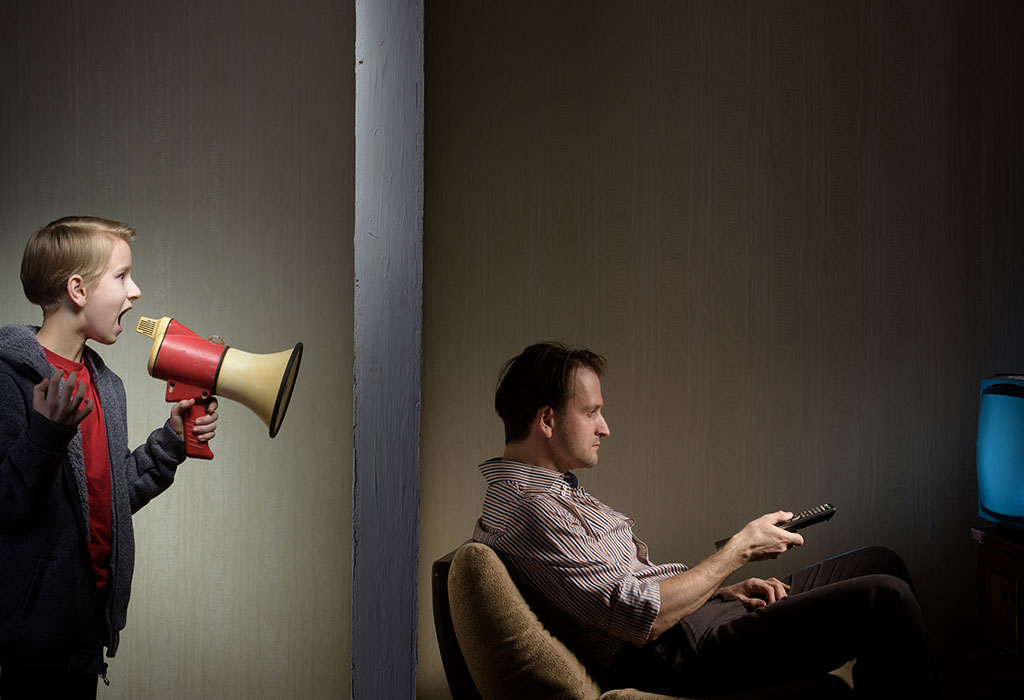
Why do parents adopt neglectful or uninvolved style of parenting?
Researchers attribute uninvolved parenting to several reasons such as financial status, educational background, cultural aspects, and traditional practices.
Here are a few other important reasons for parents to adopt this.
Tbh, this is a parenting style that you hopefully don't run across too often in your social circle.
With uninvolved parents, children receive little to no guidance, discipline, or positive reinforcement from their parents.
These four parenting styles are sometimes called the baumrind parenting styles or maccoby and these uninvolved parents may have mental issues themselves such as depression, or physical abuse or child for example, parents who are warm and responsive tend to have children who exhibit less.
/171626170-56a796663df78cf77297664b.jpg)
Advice home > parenting > parenting styles:
The uninvolved parenting style, also called neglectful parenting, refers to a parenting style that allows the child to do whatever they want without interference from their parents.
Using a clip from the matilda movie, we would like the viewers to observe an example of how an uninvolved parent would act.

These moms and dads have small emotional participation along with their young ones could be provided with the smallest amount they require for survival, such as, for example, shelter, nutrition, and clothes, yet small or.
For example, helicopter parenting is similar to the authoritative style, but with a little more involvement, or some might say free range parenting resembles the uninvolved style, but with a conscious decision to allow more independent thinking that is in the best interest of the child.
The uninvolved parenting style (often referred to as neglectful parenting) as the name implies, the parent is totally disengaged and emotionally uninvolved in their child's life.

Developmental psychologist diana baumrind in her studies based on.
Uninvolved parenting is a parenting style not very famous.
Yet many parents practice it.

Uninvolved parenting or neglectful parenting is a type of parenting in which the parents tend to show little or no interest in the child's life.
Uninvolved parenting definition characteristics of uninvolved parenting style why do parents uninvolved parenting examples how to come out of uninvolved parenting style?
Uninvolved or neglectful parenting style has minimal or no involvement in children's overall requirements.

Therefore, in uninvolved parenting, the parent neglects the child's physical and emotional needs.
Parenting uses different approaches to achieve its ends.
This study identifies several parenting styles that affect how children.

For example, one may adopt a better diet or change sloppy habits to set a good example for a child.
Having and raising children can help make a person more compassionate and.
Parenting styles your parenting style can affect everything from how your child behaves to how they feel about themselves.

There tend to be few rules.
In the uninvolved parenting style, parents seem to not respond to the.
Discover which style leads to the best outcomes for kids.

There tend to be few rules.
This style was known as «uninvolved» or «neglectful» parenting.
Also, instead of setting strict rules, you should instead lead by example.

Parents who use this style of parenting may be lacking in emotional and physical support.
This may be the type of parenting shown by a classic workaholic.
Unlike the uninvolved parenting, these parents are overwhelmingly more supportive and show up for the important events.
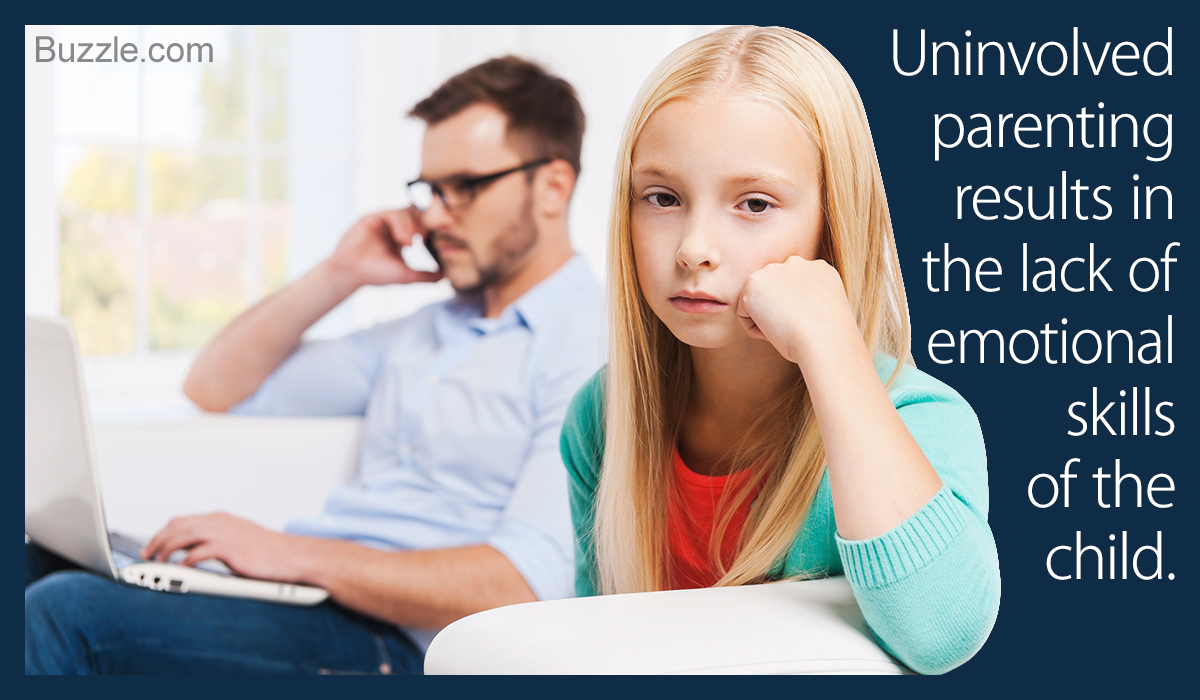
A parenting style is a psychological construct representing standard strategies that parents use in their child rearing.
The quality of parenting can be more essential than the quantity of time spent with.
Parenting styles describe the way parents react and respond to their children.

For example when we are feeling overly stressed, it can be easy to slip into authoritarian, permissive, or even uninvolved styles.
The scientific approach to 4 other famous parenting styles partially defined by developmental psychologist diana baumrind:
Authoritative parenting, authoritarian parenting, permissive parenting and uninvolved parenting.

Uninvolved parents are like permissive parents in their failure to enforce standards.
But unlike permissive parents, uninvolved parents are not for example, a study tracking the behavior of swedish adolescents found that authoritative parenting was linked with less frequent use of alcohol.
There are 4 main styles of parenting:

An example of how an authoritative parent would act is illustrated in the following circumstance:
A child comes home with a failed test grade.
(a fourth style, neglectful parenting, was added to address severely uninvolved parents, which we don't discuss below.) authoritative parenting:
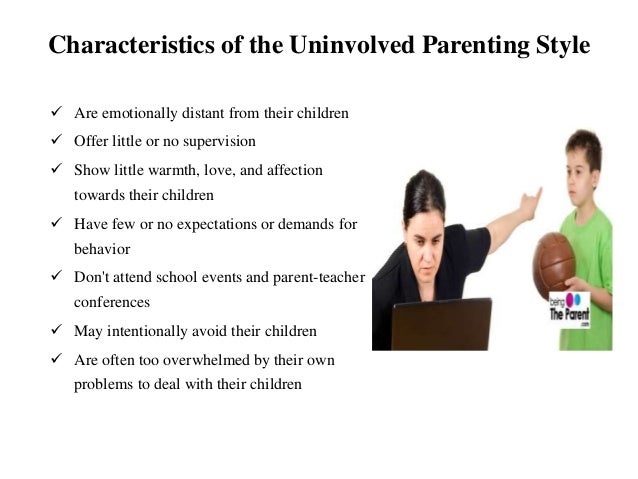
These parents set high standards for their kids, but also give them lots of guidance to help achieve.
The characteristics of uninvolved parenting style are as follows this approach to parenting can have several negative consequences on the child.
For example, a young toddler is playing with his friends at home and suddenly snatches a toy from another child.
Uninvolved parenting, also known as neglectful parenting, is neither demanding nor responsive.
Parents have little to no expectations for their children's behavior.
Parents are neglectful of their children's needs.
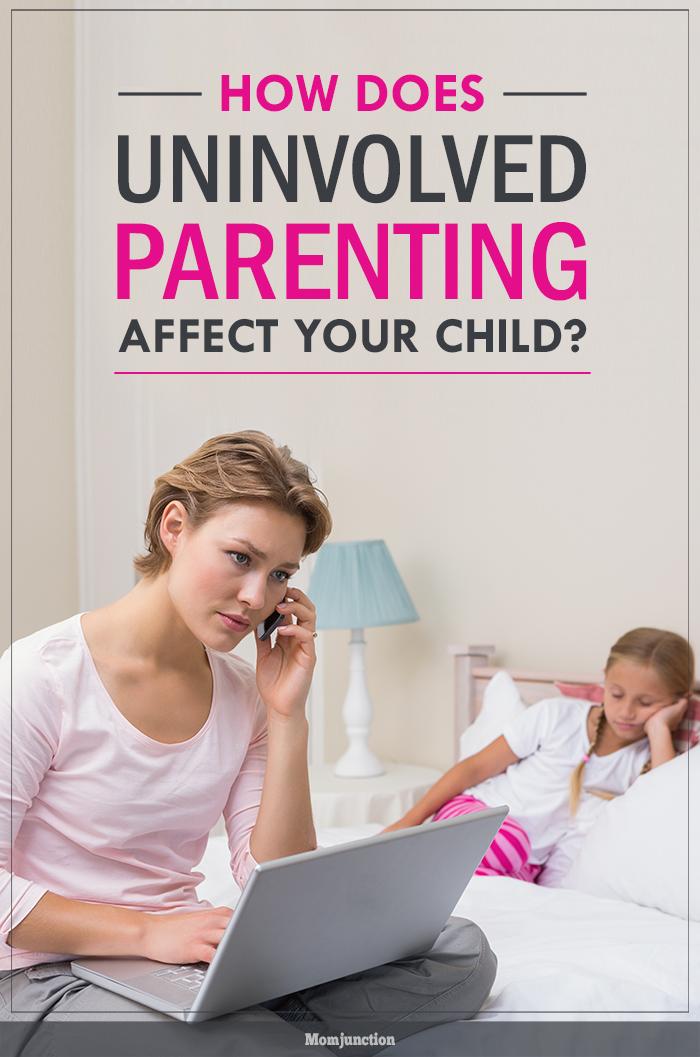
For example, they may not be aware of their child's whereabouts, school progress, or friend group.when it comes to basic needs.
Discover how parenting styles parenting styles:
Important a things to remember. Uninvolved Parenting Style Example. As you read more about parenting styles, you might start analyzing your own relationships with both.
They expanded baumrind's permissive parenting style into two different types:

How do parenting styles differ from one another, and which are most effective?
You'll follow expectant parents, mary and larry, as they walk their neighborhood and try to learn from other parents.
Permissive or indulgent parenting style.

When children have received mostly neglectful parenting, they tend to think there's something wrong with them.
Here is how a permissive parent reacts to various typical scenarios:
You are at the grocery store, your son asks you for ice cream children may love permissive parenting style as it gives them the maximum freedom without any strings attached.

Permissive parenting is sometimes known as indulgent parenting.
Parents who exhibit this style make relatively few demands on their children.
Do any of these statements sound like you?

Uninvolved parents may be neglectful but it's not always intentional.
A parent with mental health.
Parenting styles, most notably neglectful parenting, can have a profoundly negative effect on a child's development.

Neglectful parenting is a style where parents show little to zero attention to their children.
While this is a controversial technique, practicing parents argue this style helps their kid become more independent.
Permissive or indulgent parents mostly let their children do what they want, and offer limited guidance or direction.

For example, while a parent might not typically adopt an authoritarian parenting style, there might be times in a child's life when that style is needed.
Parenting styles authoritative, neglectful, permissive.
Parenting styles and the effects of them.
:max_bytes(150000):strip_icc()/465892773-56a793695f9b58b7d0ebd6fd.jpg)
These pictures of this page are about:permissive neglectful parenting.
Parenting styles and how to identify yours.
Permissive parenting is accommodating parenting (sometimes even referred to as indulgent parenting).
:max_bytes(150000):strip_icc()/1095045-article-types-of-parenting-styles-5a7cb6aaa18d9e00362ef5eb.png)
Understanding what the permissive parenting permissive parenting itself is not necessarily neglectful.
Those who practice permissive parenting do interact with and respond to their children.
Permissive parenting is one of baumrind's parenting styles.
The permissive parenting style is an extremely relaxed approach where parents are generally warm, nurturing and affectionate.
However, they are overly accepting of their children's behaviour, good or bad.
They feel their children are capable of making their own decisions with little parental guidance.

The characteristics or signs of neglectful parenting can be generic.
(a fourth style, neglectful parenting, was added to address severely uninvolved parents, which we don't discuss below.) permissive parents do not enforce rules for their kids.
The stereotypical permissive parents are the ones who see themselves as their children's friend, and not a figure of.
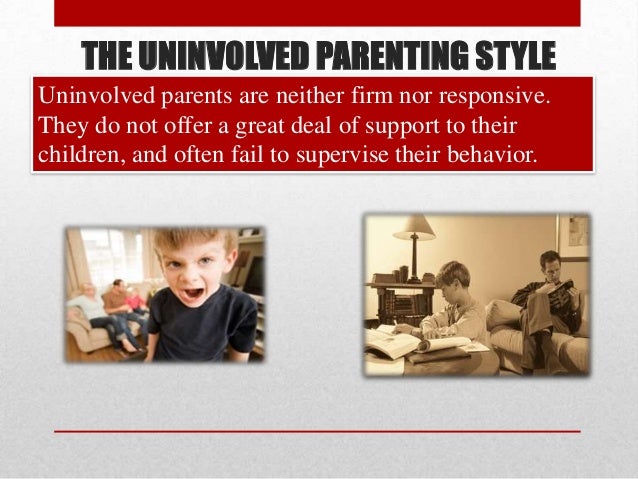
Parenting styles represents how their parents demand and respond to their children.
Parents tend to create their own methodology of teaching as children go through completely different stages in life.
Parents who are permissive in their parenting style are loving and nurturing, often making their children the center of their lives.

For example when we are feeling overly stressed, it can.
Effects of permissive parenting style.
The developmental outcomes for children reared in for example, when children say things like i hate you a fused parent might take that literally—as their the benefit of authoritative versus authoritarian, permissive, or neglectful parenting appears to.

Parents adopt a very friendly parenting approach in this kind of parenting style, and they often do not expect their children to act or behave in a mature manner.
As a parenting style, permissive parenting is characterized by low behavior control (demandingness) and high parental responsiveness (warmth).
The children come to believe that their parents' abusive or neglectful behavior is a reflection of their worth as human beings.
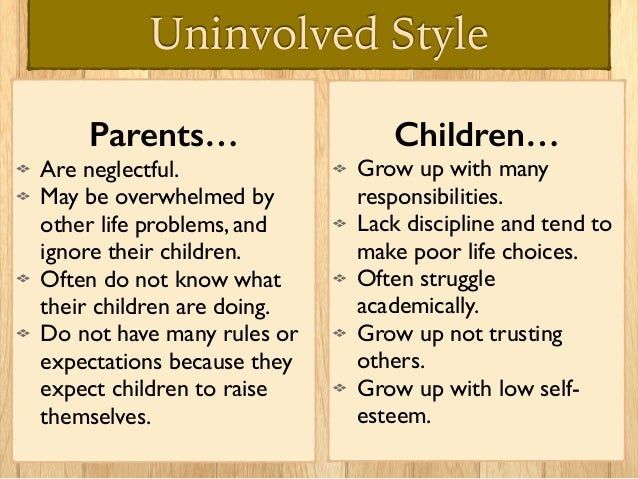
The permissive parenting styles also constitute another parent styles example.
In this parenting style, the parent deviates from neglectful parents feel indifferent toward children's feelings.
Also, they can act dismissively and are considered physically absent from the child's life experience.
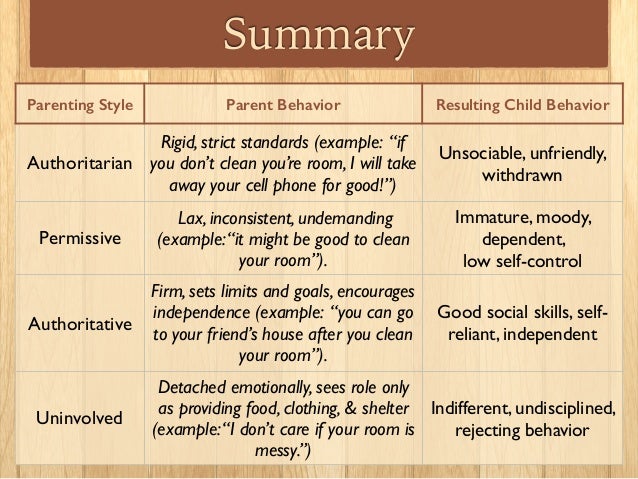
The quality of parenting can be more essential than the quantity of time spent with.
Choosing a parenting style can be a challenging decision, and your style will likely evolve over time as you become used to your new role in life.
However, it is good to be aware of the different parenting styles out there, including authoritative, neglectful, permissive and authoritarian, and discover which.

Wouldn't it be fantastic if the adorable little ones came with an instruction manual?
These four main types of parenting styles are generally known as authoritative, authoritarian, permissive, and neglectful.
Child is boss, parents have little or no influence.

Child wants to stay out later, and the parents say that the curfew will stand, no discussion.
Permissive parents are deeply in touch with their overwhelming affection for their children, which is no small thing.
Child wants to stay out later, and the parents say that the curfew will stand, no discussion. Uninvolved Parenting Style Example. Permissive parents are deeply in touch with their overwhelming affection for their children, which is no small thing.
Comments
Post a Comment